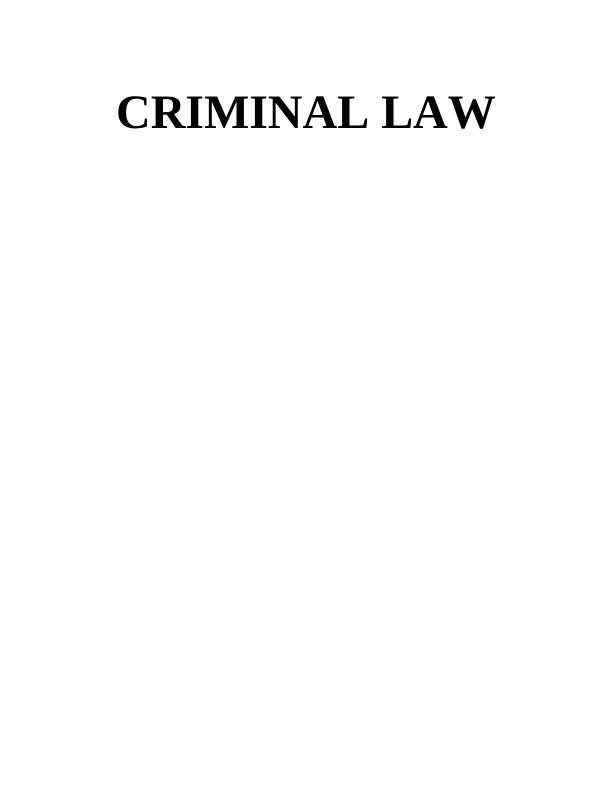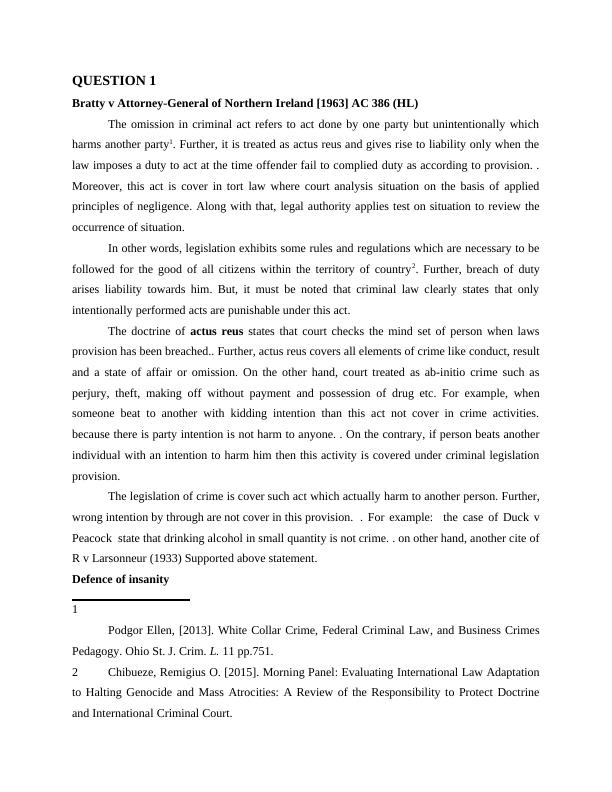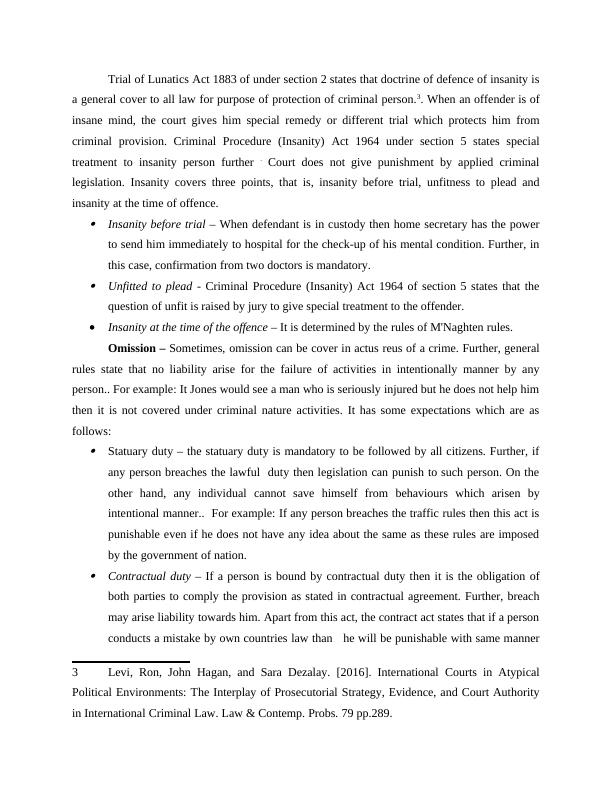Criminal Law Assignment (Doc)
Added on 2020-01-21
11 Pages3860 Words161 Views
CRIMINAL LAW

TABLE OF CONTENTSQUESTION 1...................................................................................................................................3QUESTION 2...................................................................................................................................6CONCLUSION..............................................................................................................................10REFERENCES..............................................................................................................................11

QUESTION 1Bratty v Attorney-General of Northern Ireland [1963] AC 386 (HL)The omission in criminal act refers to act done by one party but unintentionally whichharms another party1. Further, it is treated as actus reus and gives rise to liability only when thelaw imposes a duty to act at the time offender fail to complied duty as according to provision. .Moreover, this act is cover in tort law where court analysis situation on the basis of appliedprinciples of negligence. Along with that, legal authority applies test on situation to review theoccurrence of situation.In other words, legislation exhibits some rules and regulations which are necessary to befollowed for the good of all citizens within the territory of country2. Further, breach of dutyarises liability towards him. But, it must be noted that criminal law clearly states that onlyintentionally performed acts are punishable under this act. The doctrine of actus reus states that court checks the mind set of person when lawsprovision has been breached.. Further, actus reus covers all elements of crime like conduct, resultand a state of affair or omission. On the other hand, court treated as ab-initio crime such asperjury, theft, making off without payment and possession of drug etc. For example, whensomeone beat to another with kidding intention than this act not cover in crime activities.because there is party intention is not harm to anyone. . On the contrary, if person beats anotherindividual with an intention to harm him then this activity is covered under criminal legislationprovision.The legislation of crime is cover such act which actually harm to another person. Further,wrong intention by through are not cover in this provision. . For example: the case of Duck vPeacock state that drinking alcohol in small quantity is not crime. . on other hand, another cite ofR v Larsonneur (1933) Supported above statement.Defence of insanity 1Podgor Ellen, [2013]. White Collar Crime, Federal Criminal Law, and Business CrimesPedagogy. Ohio St. J. Crim. L. 11 pp.751.2Chibueze, Remigius O. [2015]. Morning Panel: Evaluating International Law Adaptationto Halting Genocide and Mass Atrocities: A Review of the Responsibility to Protect Doctrineand International Criminal Court.

Trial of Lunatics Act 1883 of under section 2 states that doctrine of defence of insanity isa general cover to all law for purpose of protection of criminal person.3. When an offender is ofinsane mind, the court gives him special remedy or different trial which protects him fromcriminal provision. Criminal Procedure (Insanity) Act 1964 under section 5 states specialtreatment to insanity person further . Court does not give punishment by applied criminallegislation. Insanity covers three points, that is, insanity before trial, unfitness to plead andinsanity at the time of offence.Insanity before trial – When defendant is in custody then home secretary has the powerto send him immediately to hospital for the check-up of his mental condition. Further, inthis case, confirmation from two doctors is mandatory.Unfitted to plead - Criminal Procedure (Insanity) Act 1964 of section 5 states that thequestion of unfit is raised by jury to give special treatment to the offender.Insanity at the time of the offence – It is determined by the rules of M'Naghten rules.Omission – Sometimes, omission can be cover in actus reus of a crime. Further, generalrules state that no liability arise for the failure of activities in intentionally manner by anyperson.. For example: It Jones would see a man who is seriously injured but he does not help himthen it is not covered under criminal nature activities. It has some expectations which are asfollows:Statuary duty – the statuary duty is mandatory to be followed by all citizens. Further, ifany person breaches the lawful duty then legislation can punish to such person. On theother hand, any individual cannot save himself from behaviours which arisen byintentional manner.. For example: If any person breaches the traffic rules then this act ispunishable even if he does not have any idea about the same as these rules are imposedby the government of nation.Contractual duty – If a person is bound by contractual duty then it is the obligation ofboth parties to comply the provision as stated in contractual agreement. Further, breachmay arise liability towards him. Apart from this act, the contract act states that if a personconducts a mistake by own countries law than he will be punishable with same manner3Levi, Ron, John Hagan, and Sara Dezalay. [2016]. International Courts in AtypicalPolitical Environments: The Interplay of Prosecutorial Strategy, Evidence, and Court Authorityin International Criminal Law. Law & Contemp. Probs. 79 pp.289.

End of preview
Want to access all the pages? Upload your documents or become a member.
Related Documents
Mens Rea and Actus Rea in Criminal Lawlg...
|4
|758
|205
Criminal Law: Actus Reus and the Role of Automatism, Insanity, and Diminished Responsibilitylg...
|13
|3299
|481
Theories of Punishment in Indian Penal Codelg...
|5
|2162
|101
Case Study on Criminal Law PDFlg...
|9
|2588
|14
Criminal Law: Understanding the UK Legal System and Its Application in Various Caseslg...
|9
|2769
|442
Theories of Criminal Law -lg...
|17
|4620
|17
